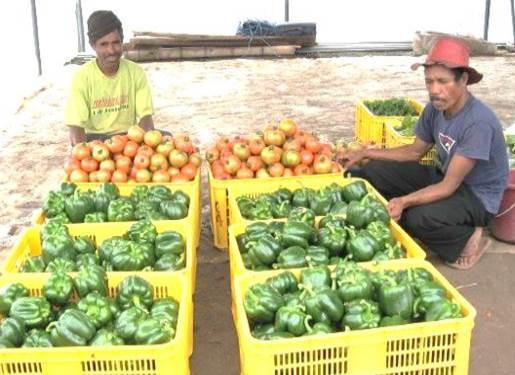|
Objetivu:
Hodi aselera kreximentu ekonomia ne’ebe inkluzivu no sustentável liu husi hasae produtividade no rendimentu ba iha valor ortikultura no hodi promove nutrisaun no atividade klima-matenek agrikultura ne’ebe apoiu ba hasae produsaun ai-han, rendimentu agrikultura, no kapasitasaun ba feto.
|
Lokalidade:
Munisípiu Aileu, Ainaro, Bobonaro, Ermera, no Dili.
|
|
Save de Parseria:
Ministériu Agrikultura no Peska, Komérsiu no Indústria, Edukasaun, no saúde; Organizasaun setór privadu.
|
Durasaun:
Abril 2015 - Marsu 2020
|
|
Kontratu:
$19,200,000
|
|
Parseria Kontaktu:
Ana Sequeira
Espesialista Komunikasaun USAID’s Avansa Agrikultura
Email: info@avansaag.com
|
USAID Kontaktu:
Mark Henderson
Ofisiais Agrikultura
Email: mahenderson@usaid.gov
|
Background
USAID’s Avansa Agrikultura Project (Avansa Agrikultura) aims to accelerate sustainable and inclusive economic growth in the agriculture sector. At the end of the project, USAID anticipates that over 33,000 people in 250 communities will be earning higher incomes, realizing improved nutrition, and managing their economic assets more effectively.
Avansa Agrikultura is implemented via a phased approach, building on development gains made through previous projects and piloting new interventions. The project will begin activities in a small number of communities the first year and then scale up successful interventions to reach the targeted number of communities over five years. Avansa Agrikultura also uses a learning approach; through ongoing monitoring to assess efficiency and effectiveness, the project makes adjustments as necessary.
Over 33,000 people in 250 communities will be earning higher incomes, realizing improved nutrition, and managing their economic assets more effectively.
Avansa Agrikultura focuses on Timor-Leste’s horticulture value chain and aims to address the key challenges of rural poverty, natural resource degradation, food insecurity, and under-nutrition. The value chain approach is applied to achieve increased productivity along key horticulture value chains including vegetables, fruits, and legumes. Through promoting sustainable production practices, increasing the functionality of farmer groups and associations, improving market linkages, and increasing the availability of and access to quality agricultural inputs and services, including access to finance, the project aims to stimulate and support increased economic activity and growth in rural communities and municipalities. The project enhances the sustainability of these activities by working to maintain sound policies, supporting an enabling environment relevant to the sector, increasing resilience to climate change, and improving natural resource management as it relates to farm systems.
Summary
Through USAID’s Avansa Agrikultura Project, USAID continues to build on the development gains with farmers, buyers, and communities. The project works to diversify models of engagement beyond contract farming and explore other opportunities to expand market linkages and support economic growth in the sector. A fundamental focus of Avansa Agrikultura is developing long-term sustainability by strengthening the private sector and local partners responsible for service delivery to rural farmers.
The project has four primary integrated components:
-
Strengthening the horticulture value chain;
-
Improving natural resources management;
-
Improving nutrition and livelihoods; and
-
Transitioning subsistence farmers to commercial growers.









Comment
Make a general inquiry or suggest an improvement.